De Belgische dichter, schrijver en geoloog Alfred Fréderic Hegenscheidt werd geboren in Sint-Jans-Molenbeek op 6 april 1866.Zie ook alle tags voor Alfred Hegenscheidt op dit blog.
Avond aan Zee
De gladde golven glippen naar de rede
Met klaterend even, weer gesmoord gekoos,
De hemel schemert over zee, en mede
Is vrede wijd en zijd en tijdeloos.
En uit de haven komen zij gegleden
De boten met hun zeilen roereloos,
Een kantige schaduw tegen donkerheden,
In ’t spiegelende nat een schaduw broos.
De nacht is peilloos; waar de verte zwicht,
Verschijnt, verdwijnt het wezenloze licht
Van ene baken in de zee verloren.
De boten, onbeweeglijk, gaan te lore.
Ginds in de nachtelijke wederschijn,
Schaduw en schaduwbeeld verschemerd zijn.
Marialiedje
Ik heb u lief en ken u niet,
Ik weet niet wat me in ’t hart geschiedt
Als in uw oogjes klaar en blauw
Mijn eigen aanschijn ik aanschouw.
Gij zijt van mij, ik voel het toch
En toch zoo vreemd weer, vreemder nog
Dan al wat van u, kindje zoet,
Ik gissen durfde en heb vermoed.
Ik droomde van u meen’gen nacht
Toen de engel boodschap had gebracht,
En toen verstond ik beter u
Dan ’t vleesch en bloed dat gij zijt nu.
Uw oogen zijn zoo eindloos diep,
’t Is of uit hen Gods stem me riep,
Zeg, kindeken, blijft gij bij mij,
Of keert weldrâ gij tot Gods zij.
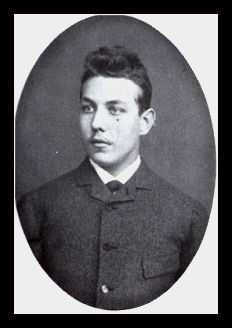
Alfred Hegenscheidt (6 april 1866 — 9 februari 1964)
De Franse schrijver en aforist Nicolas Chamfort, pseudoniem van Sébastien Roch Nicolas, werd geboren op 6 april 1740 in Clermont – Ferrand. Zie ook alle tags voor Nicolas Chamfort op dit blog.
Uit: Des femmes, de l’amour, du mariage et de la galanterie (Maximes et Pensées)
« CCCLXVIII
L’amour le plus honnête ouvre l’âme aux petites passions. Le mariage ouvre votre âme aux petites passions de votre femme, à l’ambition, à la vanité, etc.
CCCLXIX
Soyez aussi aimable, aussi honnête qu’il est possible, aimez la femme la plus parfaite qui se puisse imaginer, vous n’en serez pas moins dans le cas de lui pardonner ou votre prédécesseur, ou votre successeur.
CCCLXX
Peut-être faut-il avoir senti l’amour pour bien connaître l’amitié.
CCCLXXI
Le commerce des hommes avec les femmes ressemble à celui que les Européens font dans l’Inde ; c’est un commerce guerrier. »

Nicolas Chamfort (6 april 1740 – 13 april 1784)
Het bekendste aforisme van Chamfort in het Engels op een t-shirt
De Armeense dichter en schrijver Levon Shant werd geboren als Levon Seghposian in Konstantinopel op 6 april 1869. Zie ook alle tags voor Levon Shant op dit blog.
Uit: Ancient Gods (Vertaald door Anne T. Vardanian)
“MAN IN WHITE
Suffering is the submission to a life of pain; and the willful waste of life is death.
FATHER SUPERIOR
Through you speaks primitive mankind.
MAN IN WHITE
It is ailing mankind that speaks through you!!!
FATHER SUPERIOR
Enough! Who are you that speaks so profanely? Begone! There is no place on this island for you and your gods.
MAN IN WHITE
This island, too, is the world, and very much like the rest of the world. Oh, you bewildered, pay homage to the eternal gods!!!
FATHER SUPERIOR
Go away!
MAN IN WHITE
Confess, and pay homage!
FATHER SUPERIOR
Go away!
MAN IN WHITE
The day will come and you will confess. (He disappears.)
FATHER SUPERIOR (looks about uncomfortably)
Who was that? He vanished! An apparition, a doubt? No, never! The world cannot enter this island. The world shall never enter this island. No!”
Levon Shant (6 april 1869 – 29 november 1951)
Borstbeeld in Beiroet
De Noorse dichter en journalist Aasmund Olavsson Vinje werd geboren op 6 april 1818 in Vinje, Telemark. Zie ook alle tags voor alle tags voor Aasmund Olavsson Vinje op dit blog.
Der Wald
Du beugst, o Wald, Dich niederwärts
Und küssest jene schwarze Flut,
Die nagend frisst Dein Wurzelherz
Und saugt und trinkt von Deinem Blut.
Wie Dich hab’ Manchen ich gekannt,
Der Lenz und Lust im Herzen trug
Und dennoch küsste jene Hand,
die ach! ihm tiefste Wunden schlug.
Mein Herz
Mein Herz hat gestanden im Lebensstreit
und manchen Schlag hingenommen.
Sein Schicksal war lauter Feindseligkeit
und doch ist es bis zu dieser Zeit
mit dem Leben davon gekommen.
Doch Narb’ um Narb’ in der Jahre Lauf,
Die zeugen von mancher Wunde,
Die brechen in jeglichem Frühling auf,
Wenn das Eis zerschmilzt und es grünt darauf
Und der Kukuk bringt frohe Kunde.
Doch Blumen entspriessen der Narben Spur,
Wenn Thränen sie heimlich begossen.
So geht es ja auch mit Gottes Natur:
Wenn Regenwetter vom Himmel fuhr,
lässt Blumen aus Wunden sie sprossen.
Vertaald door Wilhelm Henzen
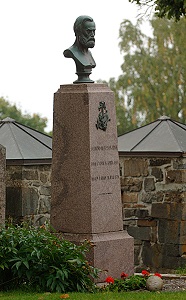
Aasmund Olavsson Vinje (6 april 1818 – 30 juli 1870)
Monument in Granavollen, Gran, Noorwegen
De Zweedse dichter en schrijver Dan Andersson werd geboren op 6 april 1888 in Skattlösberg (Dalarna). Zie ook alle tags Dan Andersson op dit blog.
For My Sister
Now on the bog in yellow sedge there is a wind of spring
and legends rise around the island in the Berga Falls
Excuse a touch of bitter joy, to my guitar I’ll sing
the strength to cure us like the tender sweet gale health recalls
A song for you my sister when the earth’s expecting spring
Luossa’s heather’s full of lively wind and frantic bees
that’s where we learnt in infancy the walk of suffering
and how to drain our childhood’s cup of sorrow to the lees
But glorious glorious spring came on each year in roses veiled
though stinging sorrow found our hearts and whitened our cheeks
One day you knelt before the King, one night your courage failed
and then you drank salvation out of mountains, hills and creeks
Come out when storm is raging in the fruit and willow trees
Look at the burning skies of spring our Lord and stars to praise
the mignonette outside your wall to your sweet slumber sees
then roses cry, come out to us and sleep in our embrace!
Vertaald door Ake Helgesson
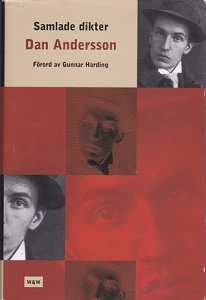
Dan Andersson (6 april 1888 – 16 september 1920)
Cover
De Duitse dichter, schrijver, anarchist en activist Erich Mühsam werd geboren in Berlijn op 6 april 1878. Zie ook alle tags Erich Mühsam op dit blog.
Babette
Folg mir in mein Domizil,
liebes Kind, und frag nicht viel.
Wirst schon alles lernen,
wirst schon alles sehn,
liest nicht in den Sternen,
was dir heut noch alles kann für Heil geschehn.
Stehst herum in Nacht und Wind.
Komm! Bei mir ist’s warm, mein Kind.
Geb dir einen Taler,
koch dir ein Glas Tee.
Einen Emmentaler
essen wir selbander auf dem Kanapee.
Bleibst bei mir bis früh am Tag.
Geht dann jeder, wo er mag.
Ich zum Redaktöre,
du, wohin dich’s treib.
Morgen küsst, ich schwöre,
dich mein guter Nachbar, ich des Nachbars Weib.
Durch Ekel fahr ich…
Durch Ekel fahr ich meinen Lebenskarren.
Der Kutschbock kracht. Es ist ein elend Holpern.
Die Gäule, die man Jahre heißt, sie stolpern
in faulem Trott, und alle Fugen knarren.
Aus ungeölten Speichen quiekt mein Gott –
kein Witz hilft, den ich in die Deichsel träufl! –
So klappert’s durch die Welt. – Als Hüh und Hott
keif peitschend ich den Mähren zu: Pfui Teufel!
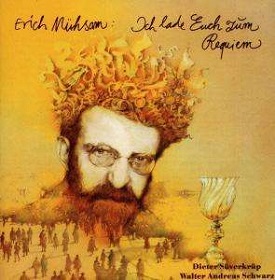
Erich Mühsam (6 april 1878 – 10 juli 1934)
Cover CD
De Franse, anarchistische, schrijver Georges Darien werd geboren als Georges Hippolyte Adrien op 6 april 1862 in Parijs. Zie ook alle tags Georges Darien op dit blog.
Uit: Biribi, discipline militaire
« L’armée, c’est le cancer social, c’est la pieuvre dont les tentacules pompent le sang des peuples et dont ils devront couper les cent bras, à coups de hache, s’ils veulent vivre.
Ah ! je sais bien : le patriotisme !… Le patriotisme n’a rien à faire avec l’armée, rien ; et ce serait grand bien, vraiment, s’il n’était plus l’apanage d’une caste, la chose d’une coterie, l’objet curieux que des escamoteurs ont caché dans leur gibecière, et qu’ils montrent de temps en temps, mystérieux et dignes, à la foule béante qui applaudit. Ce sentiment-là, je crois, n’est pas forcément cousu au fond d’un pantalon rouge. Il y a peut-être autant de patriotisme dans l’écrasement banal d’un maçon qui tombe d’un échafaudage ou dans la crevaison ignorée d’un mineur foudroyé par un coup de grisou, que dans la mort glorieuse d’un général tué à l’ennemi. Et il y a de bons patriotes, voyez-vous, qui haïssent la guerre, mais qui la feraient avec joie ― si l’on tentait d’assassiner la France ― parce qu’ils auraient l’espoir grandiose, ceux-là, non pas d’écraser un peuple, mais d’anéantir, avec le gouvernement qui le régit, toutes les tendances rétrogrades, féodales, anachroniques ― le caporalisme.
Je réfléchis longtemps à ces choses. Je pense aussi aux trois années que j’ai passées ici, à mon existence de paria ! Quelle vie ! quel spectacle !…
Et, lorsqu’ils ont défilé devant mes yeux, bien en lumière, tous ces affreux tableaux que j’évoque avec horreur, je m’aperçois que je n’en ai vu nettement qu’un côté, jusqu’à présent, et qu’une partie m’en a échappé, ― la partie la plus ignoble, sans doute, de ces conséquences de la compression.
Emporté par la passion, aveuglé par la haine, je n’ai jamais senti à mes côtés, parmi mes compagnons de servitude, que les insoumis, que ceux qui résistaient, ne voulaient pas plier ; les seuls événements qui aient frappé mon esprit sont ceux grâce auxquels s’est affirmée la lutte de l’homme qui veut rester libre contre la discipline abjecte. Les journées remplies de la farce grossière de l’existence servile n’ont rien laissé en moi. Je les ai subies, tout simplement. Et quant au grand troupeau des disciplinés, des soumis, des domestiqués, je ne l’ai même pas dédaigné, je ne l’ai point vu. Qu’une bassesse de ces malheureux, par-ci par-là, m’ait fait hausser les épaules, qu’une de leurs vilenies m’ait fait lever le cœur, c’est possible. Rien de plus.”
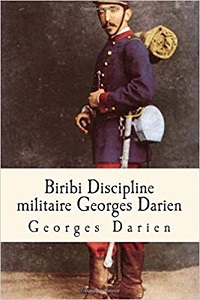
Georges Darien (6 april 1862 – 19 augustus 1921)
Cover
De Franse dichter en schrijver Jean-Baptiste Rousseau werd geboren op 6 april 1671 in Parijs. Zie ook alle tags Jean-Baptiste Rousseau op dit blog.
Uit: La Ceinture Magique
« Scène I
Mme MERLUCHE, LUCETTE, BALIVERNE.
MADAME MERLUCHE.
Or ça, mes nièces, parlons un peu d’affaires. Vous commencez à devenir grandes filles, mes enfants; et à votre âge, je le sais par mon expérience, les jours sont longs et les années sont
courtes. Je crois qu’il est temps, ou jamais, de songer à vous pourvoir. Feu monsieur Goguelu, votre père, se voyant près d’aller rendre ses comptes en l’autre monde, s’avisa de faire un
testament. Il eût bien mieux fait de mourir subitement, le pauvre homme! Il n’eut pas cet esprit-là. Il vous laissa sous la tutelle, vous du Capitan, et vous du seigneur Trufaldin; deux aussi grands benêts, sans les flatter, qu’il y en ait dans le pays. En cette qualité, il a réglé qu’ils pourraient vous épouser au bout de l’an, ou bien vous marier à leur fantaisie. Voilà l’année finie. Quelle est votre intention à toutes deux?
LUCETTE.
Hé mais, ma tante pour ce qui est de moi, dame, je ne sais pas que vous dire, car, voyez-vous une fille, enfin, vous comprenez bien.
MADAME MERLUCHE.
Voilà une réponse fort claire. Et vous?
BALIVERNE.
Ah ma tante, en vérité, vous demandez là des choses bien extraordinaires. Comment voulez-vous qu’on vous réponde? Et le moyen d’acheminer la pudeur et la bienséance aux termes d’une déclaration comme celle-là.
MADAME MERLUCHE.
Oui? Voilà donc votre réponse, mademoiselle Lucette? Et vous, mademoiselle Baliverne, est-ce là tout ce que vous avez à me dire?
BALIVERNE.
Nous ne disons pas cela, mais enfin. »
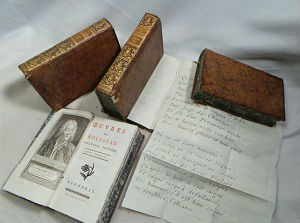
Jean-Baptiste Rousseau (6 april 1671 – 16 maart 1741)
De werken van Rousseau
De Russische schrijver, filosoof en publicist Alexander Herzen werd geboren op 6 april 1812 in Moskou. Zie ook alle tags voor Alexander Herzen op dit blog.
Uit: From the Other Shore
“In 1852 I met in London the most sharp-witted of my opponents, Solger1; he was packing in order to leave for America straight away; in Europe, it seemed, there was nothing for him to do. ‘Circumstances seem to have convinced you,’ I remarked, ‘that I was not altogether mistaken?’ ‘I didn’t need all that,’ replied Solger, laughing amiably, ‘to realize that I was writing sheer nonsense at the time.’
In spite of this charming admission, the general consensus of opinion, the abiding impression went, if anything, against me. Does not this feeling of irritation indicate the imminence of danger, fear of the future, the desire to conceal one’s weakness, a peevish, petrified old age ? . . . But where there is danger there is hope! It is the peculiar destiny of the Russians to see further than their neighbours, to see in darker colours and to express their opinions boldly—Russians, those ‘mutes’ as Michelet once called them.
This is what one of our compatriots wrote long before:
‘Who, more than we, extolled the virtues of the eighteenth century, the light of philosophy, the softening of manners, the universal spread of public spirit, the close and friendly ties binding the peoples, the mildness of rulers? . . . Though a few black clouds still appeared on humanity’s horizon, yet hope’s bright ray gilded their tips . . . we considered the end of our century would mark the end of the chief ills of mankind, and thought to see in it the fusion of theory and practice, of thought and action . . . where now is this most comforting system?
‘It destroyed itself in the making; the eighteenth century is ending and the miserable philanthropist takes but two strides to measure his grave, to lay himself down in it with his heart lacerated and betrayed, and close his eyes for ever.”
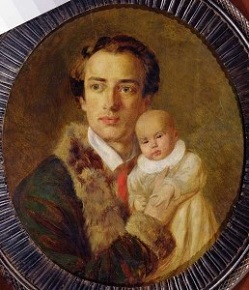
Alexander Herzen (6 april 1812 – 21 januari 1870)
Portret van Alexander Herzen met zijn zoon door Alexander Lavrentievich Vitberg, 1840
